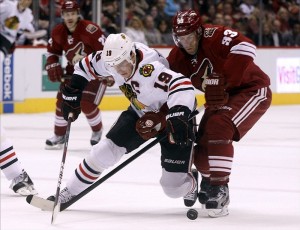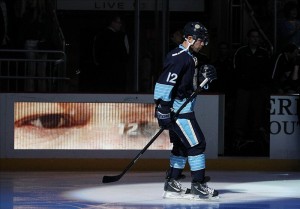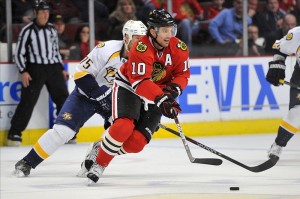In his “Magic Vs. Birds” column of the May 20 edition of The Hockey News, Adam Proteau makes his case for why he believes the Chicago Blackhawks will defeat the Pittsburgh Penguins in an epic showdown for Lord Stanley’s Cup. Given that each team seemed to pull away from the pack during the regular season, the clash is a very plausible outcome. While it is admittedly very early to consider debating who would have an advantage in what could only be described as a dream matchup for the NHL – only once since 1994 have two number one seeds met in the Stanley Cup Final — it sure is fun to talk about it.
So with that spirit in mind, we look at Proteau’s five arguments for the Blackhawks and offer a counter argument for each.
1. Jonathan Toews

Proteau’s first argument is also his most bizarre. Make no mistake about it, should the Hawks win the Cup, Toews will no doubt be an incredibly important factor. He is the unquestioned leader and heart and soul of what was the league’s best regular season squad. He has led Chicago to a Cup before and he very well could do it again this year.
But Proteau’s argument for Toews here makes little sense:
“The Blackhawk’s captain isn’t the world’s best player, but in the eyes of hockey executives canvassed by THN he’s the most worthy challenger to Sidney Crosby.”
So…you’re giving an edge to Chicago because they have the one player that could challenge Sidney Crosby, the best player on the team you happen to be giving Chicago an advantage over? How can this possibly favor Chicago? Based on this argument, the worst case scenario for the Penguins is Toews plays up to Crosby’s level and the two basically cancel each other out, for lack of a better term; the best case scenario would be that Crosby retains his title as the world’s greatest player, out plays Toews and totally negates any advantage the Hawk’s captain may provide.
2. Goaltending
We’ll concede, as Proteau suggests, that the Corey Crawford/Ray Emery tandem has certainly been more consistent between the pipes this year than that of Marc-Andre Fleury and Tomas Vokoun. In fact, the Hawks goaltenders who entered the season as the team’s biggest question marks surprised everyone by taking home the Jennings Trophy as the duo that gave up the fewest goals in the league. Fleury’s performance, meanwhile, was more erratic (particularly at the start of the season) and he did little last night to prove he can still be consistent enough to backstop a team through the rigors of four playoff rounds.
And, yet, there’s still something to be said for having done it before. Yes, everyone has to win their first one at some point but, of the four goaltenders in this potential match-up, Fleury is the only one with a ring and the only one who has faced the enormous pressure that comes with playing between the pipes in a Stanley Cup Final and actually emerged victorious. Conversely, Corey Crawford has never been past the first round and Ray Emery has experienced only three postseason dances (though he did backstop the Ottawa Senators to a Stanley Cup Finals appearance in 2007 when they eventually bowed out to the Anaheim Ducks in five games).
Does this mean Fleury will necessarily outshine either Chicago net minder in a seven game series? Of course, not. Should he manage to exorcise his demons from his past few postseason series, though, Fleury’s experience is every bit as important as what Chicago’s tandem has accomplished this year.
3. Familiarity
Proteau bases his third argument on the fact the Penguins have so many new additions to assimilate into their lineup. With the acquisitions of Jarome Iginla, Brenden Morrow, Jussi Jokinen and Douglas Murray, Proteau surmises the members of the Penguins will still be adjusting to one another if and when they meet the Hawks. Chicago, meanwhile has iced virtually the same squad for the entire season and, thus, has more of a sense of familiarity with one another. The argument sounds logical; it just doesn’t hold water.

While Jarome Iginla, for example, admittedly had some trouble adjusting to the Penguins system, he seems to have become more comfortable in his new environment. After looking somewhat out of place in his first couple of games in a Penguins sweater, he racked up nine points in the last eight games of the regular season and seems to have found a home blasting one-timers from the point on the power play.
Meanwhile, after waving a no-trade clause to come to Pittsburgh, all a rejuvenated Brenden Morrow did was lead the Penguins in scoring after the trade deadline, putting up 14 points in the 15 games he played. More importantly, he has added even more of a physical dimension to a third line that has become increasingly difficult to play against.
Jussi Jokinen? When he first came over from Carolina, he served as a sort of bridge to get the Pens through until their captain came back from a broken jaw. Playing first line minutes, the versatile Finn put 11 points in 10 games and provided Dan Bylsma with the luxury of adding one of the better face-off men in the league. Now that Crosby is back, he will add depth to the bottom six and still provide another reliable option for Pittsburgh on draws.
Finally, Douglas Murray has added a dimension to the Pens back-end that they haven’t had since Hal Gill left. He has made the Pens penalty kill better, he blocks shots, he is incredibly physical and he is down right no fun to play against.
The point is, while it has taken time for everyone to gel, the Penguins have now come together as a group and are playing as well as anyone entering the playoffs – they have won 23 of 27 games, after all. The fact that the Hawks have played with almost the same group for the entirety of a lockout shortened season will have little effect on the Pens should they meet in the Stanley Cup Finals.
4. Balance
The fourth argument of “Magic Vs. Birds” suggests that, compared to Pittsburgh, the Hawks possess a more balanced blue line:
“The bottom end of Pittsburgh’s defense is a dog’s breakfast of rookies (Simon Depres, Robert Bortuzzo) and thirtysomethings veterans (Murray, Mark Eaton) nearing the end. Simply put, Chicago’s defense has more talent and depth than Pittsburgh’s.”
While the bottom end of the Pens defensive core may consist of a combination of inexperience and players past their prime, it has gotten the job done. In fact, Mark Eaton joined the club with 23 games remaining in the season, which just so happens to coincide with the portion of the season that saw the club get away from resorting to simply outscoring opponents. Meanwhile, the aforementioned Murray’s physical, stay at home mentality has added a dimension to the Pittsburgh blue line that makes them much more difficult to play against.
Perhaps more important than the bottom end of the two team’s defensive corps, though, is that the Chicago defensemen can be exposed with physical play. They may be a deep group but they struggle to contain big, physical teams (see their 0-2-1 record against Anaheim this year, for example). And while the Penguins aren’t overly big, they certainly have the forwards to play a physical game that will wear down a Chicago blue line that will surely be fatigued after facing what promises to be a much more taxing path to the Finals than the Penguins are up against. Indeed, the likes of Chris Kunitz, Brenden Morrow, Jarome Iginla et al are more than capable of punishing the Hawks and possibly exposing them over the course of a seven game series.
5. Supporting Cast
Finally, Proteau argues that the Hawks simply have more depth at the forward position than the Penguins:
“The Penguins are as dangerous as anyone with Iginla, Morrow, Chris Kunitz and James Neal representing secondary threats after Crosby and Evgeni Malkin. But Chicago has at least as many weapons to turn to besides Toews and fellow superstar Patrick Kane, including Marian Hossa, Patrick Sharp and rookie revelation Brandon Saad.”
He goes on to say that Sharp and Hossa are first-line players on almost any team in the league but the same cannot be said for Morrow or Iginla.

But why do they need to be? The Penguins acquired the likes of Iginla and Morrow to complement their core and add a dimension to the club that they previously lacked, not to lead the team in scoring. With Kunitz (22 goals) and Pascal Dupuis (20 goals) flanking Crosby, in addition to Neal (depending on if/when he comes back) and Malkin’s chemistry, the Penguins simply need the balance of their forwards to be opportunistic and to chip in consistently. If they can do this, Pittsburgh’s group of forwards is easily as deep as any team in the league.
Again, as we begin the first round of the playoffs, it is awfully early to be breaking down this potential matchup. And, should this dream series actually become reality, Adam certainly can’t be faulted for taking the Hawks; after all, they have been the best team in the league this year. But rest assured, the Penguins will give them all they can handle.